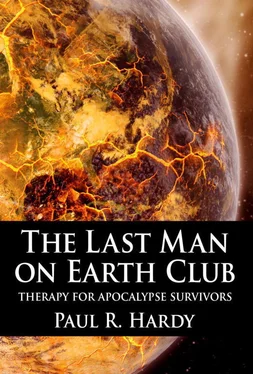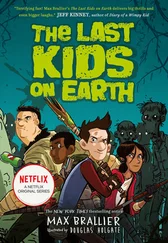He held up the withered limb, flexing the hand as far as it would go. Then let it drop and leant his head back against the pedestal.
“How long did it go on?” I asked.
“Weeks…” He looked up, towards the command centre. “Upstairs, they were trying to keep contact with survivors. It took many weeks for them to die. When it was too much, he came to see me.”
“Did anything else… happen?”
“No! No, he was not that sort of man. He loved the company of men, but… not in that way. He just wanted someone to know what happened. I think the generals pushed him into arming the cobalt bomb… he never talked about that, he only hinted. He would not blame anyone else. He accepted the responsibility as his own.” Kwame’s voice was tinged with sadness. “I was not such a man.”
“You had a very difficult life.”
“It was nothing compared to his. To do what he did with… so little.”
“Being the right man in the right place at the right time is mostly about luck. It sounds like you were a very good engineer in a country where that wasn’t appreciated.”
“Do you think my life would have been better if I had been Chifunyikan?”
“Maybe. It sounds like they were better at that kind of thing.”
“And then I would be dead. Perhaps that is something else to wish for.”
“Is that how you feel now?”
He frowned, and thought about it. “No,” he said. “I have never wanted to die…”
“Well, that’s something—”
“No. In the bunker, I had nothing to live for. I could have killed myself. Many did. I was simply a coward.”
“Okay. Maybe we can talk about that later. How did the conversation end?”
“With the President?”
“With the President.”
He sighed. “Eventually, we had to go into hibernation. But he told me the chief scientist had predicted the radiation clouds would make the surface uninhabitable for decades. Maybe longer, maybe two hundred years. The hibernation chambers would not last that long. And the chambers in the labour reserve — what you call the ‘shallow complex’ — they would fail long before then. When the bunker was built, we thought we would only have to sleep ten or twenty years at the most…” he chuckled, bitterly.
“But you did all go into the chambers?”
“Yes. I was the last one to go in. I was the only one who really knew how they worked.”
“And they failed.”
“No.”
“I’m sorry?”
“I disabled them.”
“You…” I took a moment to process that. “You killed them?”
“Yes.”
“Why?”
“Those were his last orders.”
“Can you explain that a bit more…?”
“He felt we did not deserve to live. As a species. He wept to tell me he had lost all faith in humanity. He said it again and again: we should be punished for this crime. He said that he should be punished most of all. But there was no one who could do so. Everyone knew what had happened and nobody really blamed him. So he asked me.”
“He asked you directly?”
“As much as he could.”
“It was definitely an order?”
“I remember the words: ‘We do not deserve to live, Sergeant. No one will punish us for what we have done. If there is to be any justice for this world, we must do it ourselves.’ He repeated that: “We must do it ourselves.” He looked into my eyes… and I understood. So I sabotaged the hibernation units. Everyone died in their sleep…
“But he wanted it sooner. So I opened up his casket. I had a knife, I knew he wanted it that way, but… I could not do it. I was a soldier but I never killed a man. I… kissed him… sealed him up… cut the lines instead and let him die for lack of air.”
A tear ran down his cheek. “If that is genocide… then I will stand trial for it.”
“There’ll have to be an investigation.”
“Of course.”
“I don’t know what will happen. But we’ll support you.”
“Thank you.”
“So… who are you?”
He smiled, painfully. “I do not know.”
“Still?”
“I was an engineer. I had the training necessary to understand the hibernation units… I suppose that is why they recalled me, even with my injury. But… I do not know who I was.”
“Okay. It’s still progress.” He didn’t look like he agreed. “Do you feel better?”
He looked back at me, surprised and unsure of his answer. He thought about it for a moment, and then found words: “Every answer I find becomes another question. Do you think… there will ever be an end to the questions?”
“I don’t know, Kwame… is it still okay to call you Kwame?”
“I was called Kobe, before. I think. I am not sure…”
“It’s okay. You don’t have to make your mind up right away. But with your injuries, there’s no telling what else you might recover.”
“I am not certain I wish to know more.”
I put a hand on his. “You’ve made a massive step. Now we know what we’re doing, we can treat your PTSD. There’s one thing, though.”
“Yes?”
“We can’t do it here. We have to move the group again, soon.”
“Was there another attack…?”
“No. A world is ending. We’ve just started an evacuation and they’re going to need this place for the refugees.”
“Of course. What happened?”
“Solar flares. They’re so bad they’re killing the planet. They have less than a year before there’s nothing left.”
“It never ends,” he sighed.
“No. But it always gets better. And it’ll get better for you as well. I can’t promise you’ll get back everything you lost, but it will get better.”
He sighed and leaned his head back against the pedestal.
“Then I shall have to accept that.”
The bunker disappeared more quickly than it had been built, as a small crew came in to rescape the building to another purpose: shelter and therapy for fifty or more refugees, probably those who were judged to be most disturbed when the triage teams did their work on the way down the Lift. It was only days after the announcement, and the first ships were already lifting the most vulnerable people from the battered arcologies of Ardëe to orbit and the portal to Hub.
We were not in the first batch of centres to be made available, but nevertheless the group had to pick their way around the work crew as it opened up the shuttered rooms and shaped them into dormitories and therapy rooms and everything the refugees would need. We found ourselves confined to a small corner of the building; it was simple enough to pack and we could have left straight away, but until the Diplomatic Service were ready to take us, we had to wait and carry on as best we could. With Ranev’s agreement, I decided to stay with the group until the move was made, but I hadn’t decided what I would do then. I couldn’t see past the present moment, and went on with therapy, hoping I wouldn’t stumble and let them down.
My biggest worry was still Pew. He’d been refusing therapy sessions for some time now, and had grown obsessed with physical fitness, increasing his regimen to include self-defence training from security — only the most defensive of martial arts, but pursued with a troubling zeal. However, it was his academic studies that gave me the most concern. He’d completely abandoned his university course in mathematics and physics, and moved on to a syllabus bound by a single theme: genocide. He’d read dozens of case studies of such horrors (including several from my world), and found endless disappointment and dismay at how little was done to bring perpetrators to justice. Historical crimes were forgotten or denied. Legal systems shied away from the worst excesses. Time and time again, the people who were to blame went unpunished. Even the most advanced societies did their best to cover up crimes they had committed on other worlds, and there was complicity throughout the multiverse. The dead were given memorials. The murderers continued their lives. Survivors went unheard and ignored. Business as usual.
Читать дальше












